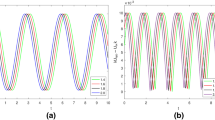Abstract
In this paper, a stochastic computational intelligence approach for solution of fractional differential equations has been used. In this method, the strength of feed forward artificial neural networks is used to accurately model the equation and Genetic algorithm applied for learning of weights aided by active set algorithm for rapid local search. The design scheme has been successfully applied to solve different types of linear and nonlinear ordinary fractional differential equations. The results were compared with exact solutions, approximate analytic solution and standard numerical techniques. In case of linear ordinary fractional differential equations, relatively more accurate solutions were obtained than standard numerical methods. However, for complex non-linear fractional differential equation, the same scheme is applicable, but with reduced accuracy. The advantage of this approach is that it provides the solution on continuous entire finite domain unlike the other numerical techniques.
Access this chapter
Tax calculation will be finalised at checkout
Purchases are for personal use only
Preview
Unable to display preview. Download preview PDF.
Similar content being viewed by others

References
Oldham, K.B., Spanier, J.: The Fractional Calculus. Academic Press, New York (1974)
Miller, K.B., Ross, B.: An Introduction to the Fractional Calculus and Fractional Differential Equations. Wiley, New York (1993)
Samko, S.G., Kilbas, A.A., Marichev, O.I.: Fractional Integrals and Derivatives and Some of Their Applications. Nauka i Technika, Minsk, Russia (1987)
Anatoly, A.K., Srivastava, H.M., Trujillo, J.J.: Theory and application of fractional differential equations. North-Holland Mathematics Studies, vol. 204. Elsevier, Amsterdam (2006)
Rarisi, D.R., et al.: Solving differential equations with unsupervised neural networks. J. Chemical engineering and processing 42, 715–721 (2003)
Aarts, L.P., Van Der Veer, P.: Neural Network Method for solving the partial Differential Equations. Neural Processing Letters 14, 261–271 (2001)
Junaid, A., Raja, M.A.Z., Qureshi, I.M.: Evolutionary Computing approach for the solution of initial value problems in ordinary differential equations. WASET 55, 578–581 (2009)
Khan, J.A., Zahoor, R.M.A., Qureshi, I.M.: Swarm Intelligence for the problems of Non-linear ordinary differential equations and its application to well known Wessinger’s equation. EJSR 34(4), 514–525 (2009)
Engheta, N.: On the role of fractional calculus in electromagnetic theory. IEEE Antennas Propagat. Mag. 39, 35–46 (1997)
Zhou, S., et al.: Chaos control and synchronization in fractional neuron network system. Chaos, Solitons & Fractals 36(4), 973–984 (2008)
Cao, J.Y., et al.: Optimization of fractional order PID controllers based on genetic algorithm. In: International Conference on Machine Learning and Cybernetics, ICMLC, pp. 5686–5689 (2005)
Tsoulos, I.G., Lagaris, I.E.: Solving differential equations with genetic programming. Genetic Programming and Evolvable Machines 7(1), 33–54 (2006)
Sivanandam, S.N., Deepa, S.N.: Introduction to Genetic Algorithms. Springer, Berlin (2008)
Weibeer, M.: Efficient Numerical Methods for fractional differential equations and their analytical Background. PhD Thesis, ch. 6 (2005) ISBN: 978-3-89720-846-9
Gorenflo, R., Mainardi, F.: Fractional calculus: Integral and differential equations of fractional order. CISM Lecture notes, International centre for mechanical Sciences, Udine, Italy (1996)
Mainardi, F.: Fractional relaxation and fractional diffusion equations, mathematical aspects. In: Ames, W.F. (ed.) Proceedings 12th IMACS world Congress, Georgia Tech, Atlanta 1, pp. 329–332 (1994)
Podlubny, I.: Fractional Differential Equations, ch. 8. Academic Press, New York (1999)
Li, C., Tao, C.: On the fractional Adams method. J. of computer & mathematics with applications 58(8), 1573–1588 (2009)
Podlubny, I.: Calculates the Mittag-Leffler function with desire accuracy (2005), http://www.mathworks.com/matlabcentral/fileexchange/loadFile.do?objectId=8738
Author information
Authors and Affiliations
Editor information
Editors and Affiliations
Rights and permissions
Copyright information
© 2010 Springer-Verlag Berlin Heidelberg
About this paper
Cite this paper
Zahoor Raja, M.A., Khan, J.A., Qureshi, I.M. (2010). Evolutionary Computational Intelligence in Solving the Fractional Differential Equations. In: Nguyen, N.T., Le, M.T., Świątek, J. (eds) Intelligent Information and Database Systems. ACIIDS 2010. Lecture Notes in Computer Science(), vol 5990. Springer, Berlin, Heidelberg. https://doi.org/10.1007/978-3-642-12145-6_24
Download citation
DOI: https://doi.org/10.1007/978-3-642-12145-6_24
Publisher Name: Springer, Berlin, Heidelberg
Print ISBN: 978-3-642-12144-9
Online ISBN: 978-3-642-12145-6
eBook Packages: Computer ScienceComputer Science (R0)



